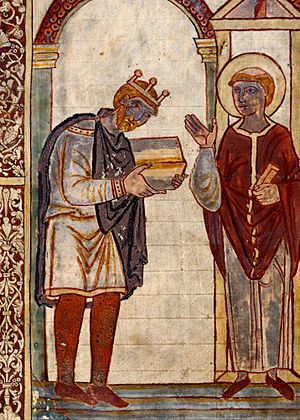Dish-bearers and butlers in Anglo-Saxon England facts for kids
Dish-bearers and butlers were important helpers for kings in Anglo-Saxon England. They were part of the king's personal staff. Dish-bearers were sometimes called seneschals by historians. Butlers were also known as cup-bearers. These roles were very important at royal feasts. Feasts were big meals that helped kings show their power and bring important people together. Dish-bearers and butlers served the food and drinks at these events.
These royal helpers were usually thegns. Thegns were important landowners and nobles in Anglo-Saxon society. They were the third highest rank, after the king and the ealdormen (powerful regional leaders). Dish-bearers and butlers also did other jobs for the king, like military or administrative tasks. Some of them became very powerful ealdormen, but most stayed as thegns.
Contents
What Their Names Mean
The main helpers at Anglo-Saxon royal feasts were dish-bearers and butlers (or cup-bearers). The word "dish-bearer" comes from Latin words like discifer or dapifer. These words literally mean "dish-carrier." In Old English, it was discþegn, which means "dish-thegn." A "thegn" was a noble or a servant of the king.
The word "butler" or "cup-bearer" comes from the Latin word pincerna and the Old English word byrele. This means someone who handles drinks. So, a pincerna was in charge of drinks, and a discifer or dapifer handled food. Historians sometimes call these roles "officers of the mouth" because they dealt with the king's food and drink.
Their Important Jobs
Royal feasts were a big deal in Anglo-Saxon times. They helped to bring important people together and show who was in charge. Dish-bearers and butlers served at these tables. They played a major part in making these feasts successful.
There might have been teams of dish-bearers and butlers. They probably worked under the supervision of two main officers. These helpers were also very flexible. They did many different jobs for the king. This included administrative tasks (like managing things) and military duties (like helping with the army).
Later in the Anglo-Saxon period, queens and the king's sons (called æthelings) also had their own dish-bearers. For example, when King Æthelred the Unready had young children, one dish-bearer named Æfic served all the æthelings together. As the sons grew up, they would each have their own group of helpers, including a dish-bearer and probably a butler. In 1014, Æthelred's oldest son, Æthelstan, left land and a horse to his dish-bearer in his will. This shows how important these helpers were.
Their High Status
Dish-bearers and butlers held a high position in the king's court. These jobs were given to thegns. Thegns were the third highest group of nobles, after the king and the ealdormen. To be a thegn, a man had to own a lot of land. Some thegns owned land in many different areas. They were expected to perform military duties and help with government tasks. A few dish-bearers and butlers were even promoted to ealdorman. This was the highest noble rank below the king.
When important documents called charters were signed, the order of names showed how important people were. Dish-bearers and butlers usually signed charters before ordinary thegns. For example, in King Eadred's will, the dish-bearer, the "rail-thegn" (who looked after the king's clothes and bedroom), and the butler were listed right after the ealdormen and bishops. This shows their high status.
A dish-bearer or butler usually served only one king. Their job often ended when that king died. For example, the butler and dish-bearer of Edith of Wessex, who was married to Edward the Confessor, stayed with her after the king died. They did not go to serve the new queen.
A Look at Their History
Most of what we know about dish-bearers and butlers comes from lists of witnesses on old charters. These jobs might have been copied from similar roles in the Frankish kingdom (modern-day France and Germany). However, there isn't much information from the early Anglo-Saxon period to be sure.
In the early 800s, important families in Wessex (a powerful Anglo-Saxon kingdom) wanted their members to become dish-bearers and butlers. Alfred the Great's grandfather, for instance, was a famous butler. During Alfred's own reign, these jobs could lead to a very successful noble career. Sigewulf, who was Alfred's butler in 892, later became an ealdorman. He died fighting Vikings in 902.
In the 900s, most dish-bearers and butlers were lesser thegns. They usually did not rise higher in rank. But some members of leading families held these posts before becoming ealdormen. For example, Wulfgar and Odda were dish-bearers under King Æthelstan. They were later promoted to ealdorman by the next king, Edmund.
Under King Edward the Confessor, members of the most powerful families (like those of Godwin and Leofric) did not become dish-bearers or butlers. This might be because these families were so powerful that court jobs were less attractive to them. In the 1060s, a new rank called "staller" was created. These stallers were between thegns and earls. Men with this new rank could also hold the office of dish-bearer.
Images for kids



